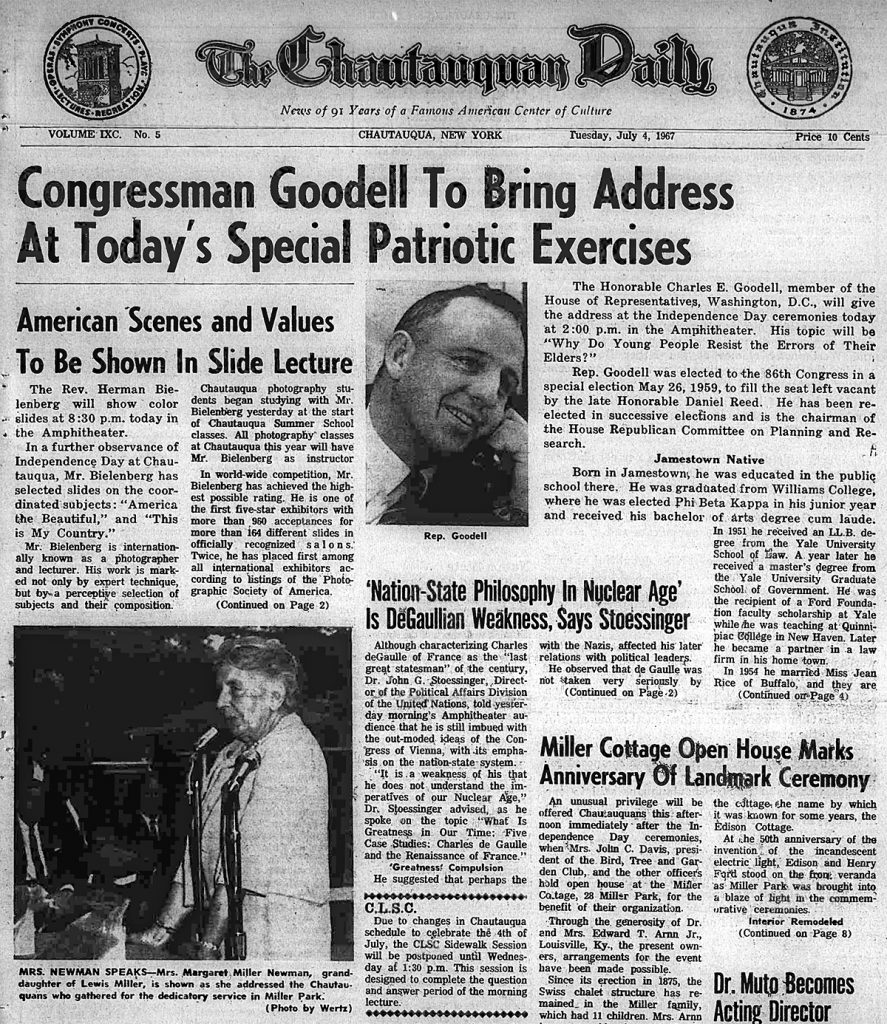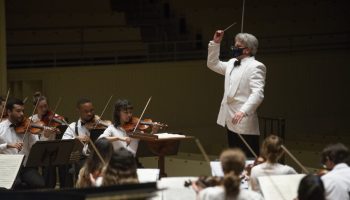Independence Day of 1967 fell on a Tuesday, 50 years ago. As one of five 10:45 a.m. lectures under the general title of “Greatness in our Time,” Dr. John D. Stoessinger, director of political affairs division of the United Nations, would talk this day on “John F. Kennedy: Facing the Brink at Cuba.”
The July 4 Chautauquan Daily announced there would be a rare open house for the Miller Cottage. The event was sponsored by the Bird, Tree & Garden Club and the small fee required to take the tour would be used to maintain the gardens for Smith Wilkes Hall, the Arboretum, the Bishop’s Garden and the Knox Garden.
 The summer of 1967 was a summer of love and a summer of discontent. In the thousands, hippies walked barefoot in San Francisco. The media conveyed hippie activity to a country piqued for cultural change, curious about and appalled by the message of peace and love, as well as protest against the Vietnam War.
The summer of 1967 was a summer of love and a summer of discontent. In the thousands, hippies walked barefoot in San Francisco. The media conveyed hippie activity to a country piqued for cultural change, curious about and appalled by the message of peace and love, as well as protest against the Vietnam War.
By the time Chautauqua President Curtis W. Haug had tapped his gavel three times to open the Chautauqua season, riots had begun in American cities, including conflicts in Buffalo just days earlier, and the days ahead in July would bring more urban violence.
Perhaps this is why the Independence Day editorial in the Daily began “A sense of uplift is not easily come by.” The editorial reflects on the previous Sunday’s ceremony at the Miller Bell Tower, a “service of dedication of the new bells, console and Westminster Chimes.” The editorial continued, “As the bell’s tones spread across Miller Park beforehand, Chautauquans hustled quietly to the scene of the dedication. The setting was natural and beautiful, if familiar.”
The editorial further engaged the subject of Independence Day, calling it “The Day For Flags,” exhorting Chautauquans to unfurl their flags on this day: “Many flags exhibited today on the Grounds will add a colorful beauty to our tree-shaded avenues.”
Headlining the Fourth of July festivities at 2 p.m. in the Amphitheater would be Congressman Charles E. Goodell, who would speak on the topic “Why Do Young People Resist the Errors of Their Elders?” The Daily reported that Goodell began his lecture by comparing his present time to that of the nation’s beginning, when Thomas Jefferson wrote the Declaration of Independence. He said he chose his topic because of “ ‘the unrest, riots, disillusionment, bitterness,’ and other upset conditions in our sick society.”
Young people have resisted their elders from time immemorial, Goodell said, “but today young people, especially young adults, are resisting with new ways … with a new vein undistorted by the wisdom of experience.” Young people seem to have an awareness of what is going on around them, but they might not be aware of the new complexities of the age.
“We have affluence amidst poverty …. The Wall Street Journal has called our era an age of vulgarity — a time of crudity and mechanistic thinking,” Goodell said.
And change was happening fast. “The fund of knowledge in the last ten years has doubled.” He added that “this new aspect of our society has served to complicate even further the complexity of our national structure.”
Contributing to that complexity is the outmoding of the economic motive that has been the “basis of our Free Enterprise System.” Goodell said that by 1982, 20 percent of the workforce will be able to produce all the material goods that our society could consume. There is a credibility gap “existing between people and advertising,” and he deplored “the undue influence of ‘those who manipulate the imagery of our Age.’ ”
More and more young people were committing more and more serious crimes. “ ‘It is a shocking fact that the seven most serious crimes listed by the FBI are committed by young people, with the 15-year-old committing the most serious, with the 16-year-old next,’ he explained.”
Although Goodell did not list any one single cause for the social ills, he said “ ‘the nature of permissiveness’ is an important factor, along with affluence and injustice.” The Daily reported that Goodell spoke strongly against adults who do not set a good example for young people and deplored the inadequacy of “religious leaders stumbling into politics who cannot even cope with problems in their own immediate responsibility of moral problems.”
He thought that the civil rights movement needed more responsible leadership, leadership “that inspires excellence in leadership and not the philosophy of getting part of the loot; part of their share.” Goodell said that young people “know all about these destructive aspects of today’s times and that it will be their duty and challenge to do something about ‘the increasing de-humanization’ of our country.’”
In the face of these challenges, Goodell expressed faith in what he called the “confidence of youth,” but worried that “our age today is moving too fast for us to be obsessed with ‘self-satisfied, self-glory.’ ”
“‘Technology may be beyond our control,’ he warned.”
“These are crucial times for our young people,” Goodell said. Although the efficiency of capitalism might be a contributing factor to the current social and political malaise, our young people “ ‘must channel our great economic machine for human purposes,’ Congressman Goodell declared, and added, ‘This is the kind of Declaration of Independence necessary for our country today.’ ”




